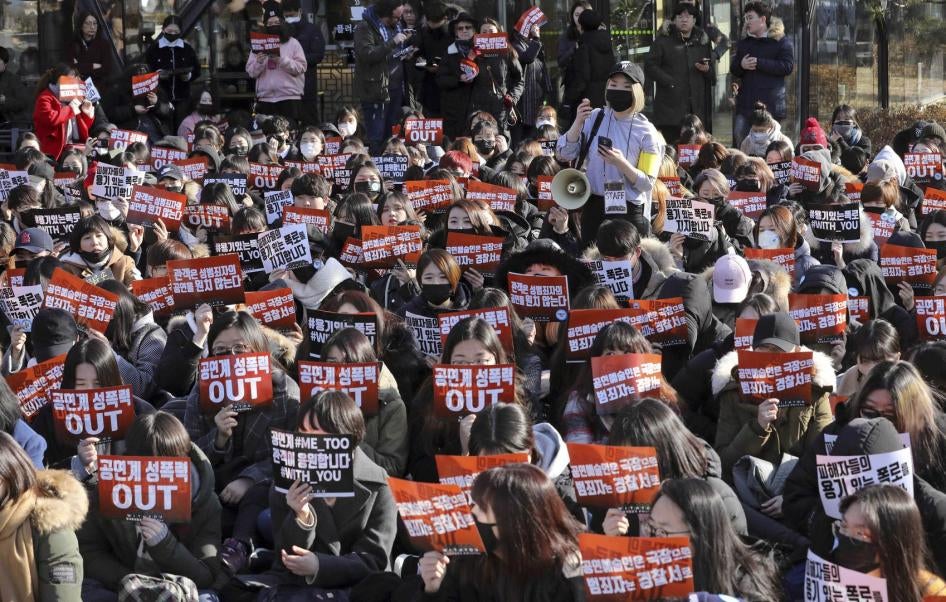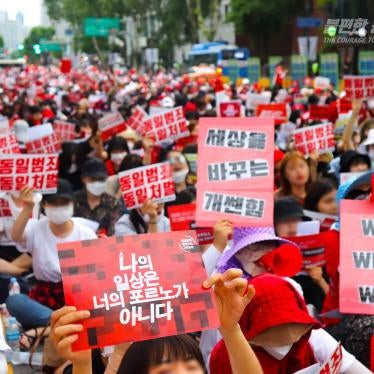(Seoul) – President Moon Jae-in of South Korea failed to raise human rights issues in his three summits with the North Korean leader Kim Jong Un during 2018, even though Moon is a former human rights lawyer, Human Rights Watch said today in its World Report 2019. Moon also did little to defend the rights of women, refugees, and LGBT persons in South Korea.
South Korea has an open and democratic governing system, with a free press and committed activists and organizations, but it still grapples with widespread discrimination against women, LGBT persons, refugees, and other at-risk groups. The South Korean government should do more to adequately address human rights issues in both North and South Korea during 2019.
In the 674-page World Report 2019, its 29th edition, Human Rights Watch reviewed human rights practices in more than 100 countries. In his introductory essay, Executive Director Kenneth Roth says that the populists spreading hatred and intolerance in many countries are spawning a resistance. New alliances of rights-respecting governments, often prompted and joined by civic groups and the public, are raising the cost of autocratic excess. Their successes illustrate the possibility of defending human rights – indeed, the responsibility to do so – even in darker times.
“President Moon has disappointed people across the political spectrum who expected much more from a former human rights lawyer who previously vowed to raise rights violations wherever and whenever they happened,” said Phil Robertson, deputy Asia director at Human Rights Watch. “Moon should change course, and act to protect and empower social minorities and vulnerable people, safeguard free expression, and make South Korea a leader on human rights throughout the Korean peninsula and Asia.”
In 2018, the #MeToo movement against sexual harassment and abuse in South Korea caused an outpouring of complaints and resignations from men in influential positions publicly accused of sexual harassment. But the protests have not successfully challenged and changed the culture of impunity for sexual assault and harassment in South Korea.
The growing LGBT movement in South Korea triggered increased resistance by conservative groups. In July, more than 210,000 people signed a petition on the South Korean president’s website demanding cancellation of the Seoul Pride Parade. While the event took place as planned, the government ducked the issue, failing to publicly defend the rights of sexual minorities to freedom of expression and peaceful public assembly. Despite women’s calls for legalization, abortion remains illegal in the country and medical service providers can be prosecuted.
Between January and May, more than 500 Yemeni asylum seekers arrived on Jeju Island. Their presence sparked the rise of an anti-refugee movement with Islamophobic overtones on the island and elsewhere in the country. Between June and July, more than 700,000 people signed a petition demanding that the government revoke the Yemenis’ refugee applications and expel them. Justice Minister Park Sang-ki reaffirmed South Korea’s international obligations toward refugees, but pledged to make efforts to root out “fake refugees.”
On October 17, the government denied the claims of 373 Yemeni asylum seekers. Thirty-four were ordered deported and plan to appeal, while another 339 received humanitarian visas to remain in the country for a year because their “right to life and personal liberty” could be at risk if they were returned to Yemen.
The Moon government has failed to clearly articulate its policy on human rights in North Korea. Between May and September, Moon met with Kim Jong Un three times but failed each time to publicly raise concerns about the horrific human rights situation in North Korea. Moon also did not act to amend South Korea’s draconian National Security Act, under which South Koreans praising North Korea can face long prison sentences.
“The South Korean government has been surprisingly weak in promoting human rights, which is a major mistake because its democracy will remain incomplete until the government firmly acts to end discrimination against women, and at-risk groups in society,” Robertson said. “President Moon should return to his roots and step up to become the global human rights champion the world needs him to be.”







